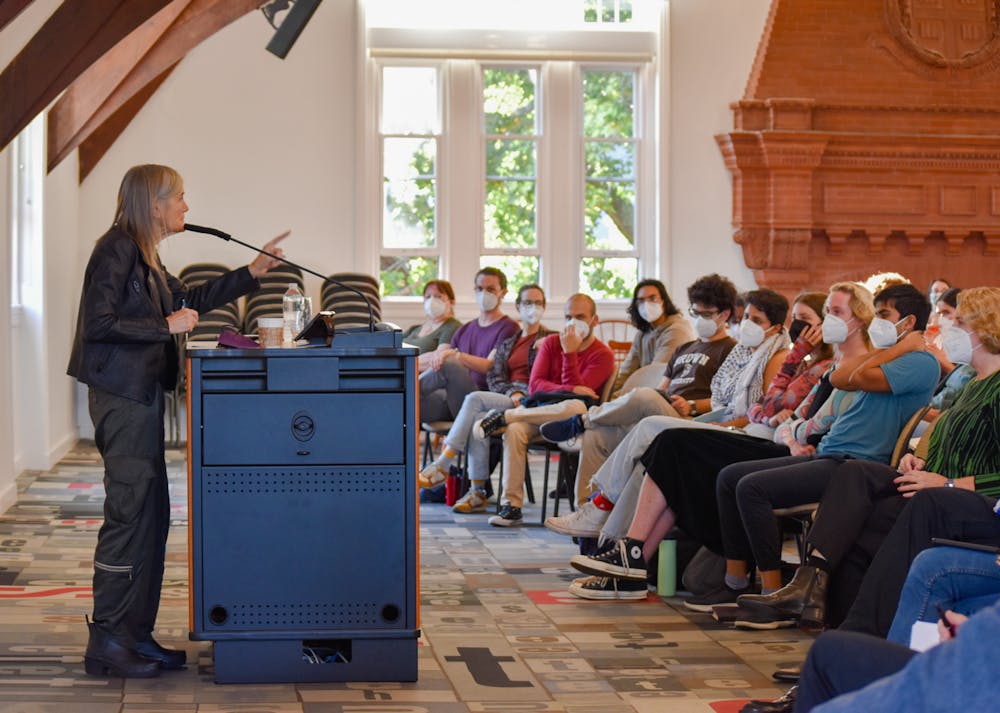“Climate and democracy are under enormous threat,” said Amy Goodman, host and executive producer of the progressive news program “Democracy Now!” at a Thursday evening event hosted by the Cogut Institute for the Humanities in Pembroke Hall. “Our ability to weather this storm depends on concerted action by the global majority who care — but against increasingly difficult odds.”
These words are as good a summary as any for the themes presented in Goodman’s talk, entitled “Democracy in Crisis.” Despite the title, the event covered a broad range of topics including environmental concerns, threats to democracy, the power of activism and the importance of independent news media. Despite the severity and daunting nature of modern crises, Goodman expressed confidence in the ability of average people to work together to ensure a democratic future.
Goodman began the talk with how “Democracy Now!” came to be, which she described as illustrative of the ways independent media threaten harmful power structures. The program began as a group of radio stations operated by Pacifica Radio, which was founded to produce news that was “not run by corporations that profit from war, but (by) journalists and artists,” Goodman said. She emphasized that “Democracy Now!” is also inspired by the same corporation-independent ethos.
In the 1970s, one of Pacifica’s stations in Houston was repeatedly blown up by a member of the Ku Klux Klan, Goodman said. These attacks and the far-right opposition that motivated them are emblematic of the power that independent media has to facilitate peace and understanding between people, Goodman said. The Klan “understood how dangerous independent media is, precisely because it allows people to speak for themselves,” she explained.
“When you hear someone speaking from their own experiences, it challenges the stereotypes and the caricatures you have,” Goodman said. “You hear a Palestinian child, you hear an Israeli grandmother, you hear an uncle in Ukraine and in Moscow. … It makes it much less likely that you’ll want to destroy them, because you understand where they’re coming from, and that understanding is the beginning of peace.”
Goodman’s talk also underscored her belief in the capacity of popular protest to change the world. She pointed to her coverage of protests against the brutal Indonesian occupation of East Timor, which lasted from 1975 to 1999. Goodman described the cruelty and terror of the occupation, including a harrowing massacre she reported on in Dili, the country’s capital.
Even the presence of American journalists, which usually deters regimes from acts of mass public violence, failed to stop the massacre, Goodman said. The coverage her team provided helped to spark a movement in America to stop the crisis, she added.
In the United States, Goodman said that the Brown community played a prominent role in the protests, advocating for a ban on U.S. arms sales to Indonesia. Students at the University worked with then-Associate Dean of the College David Targan ’79, who now teaches physics, to convince former Republican Congressman Ron Machtley (RI-1) to sponsor a successful bill to end the sales.
“Brown students called (congresspeople) as it passed from committee to committee,” Goodman said. Former West Virginia Senator Robert Byrd “complained that he thinks he heard from every student at Brown University,” she recalled.
Goodman also pointed to the 2016 Standing Rock protests of the Dakota Access Pipeline — which she also covered — as another example of the ways independent media can interface with protest movements to create change.
Although the pipeline was eventually built, Goodman said “Democracy Now!” and other news outlets were crucial in spreading information about the protests. Goodman said that video she captured of one confrontation, which featured protesters blocking bulldozers in the face of violent repression from private security officers, helped to communicate the severity of the situation to the rest of the nation, including then-President Barack Obama.
The video, she said, attracted mainstream news attention, which was crucial to protecting protesters on the ground. Goodman, in addition to many Indigenous protesters, had warrants out for their arrest, but the ensuing spotlight prevented local authorities from cracking down on them.
Although Goodman acknowledged that grassroots activism and independent media are not always a surefire fix to social injustices, she emphasized that they remain crucial in the fight for democracy and a healthy planet. Winning these fights “is painful to do,” she said, “but I think we can do it.”
“We are simply talking about the fate of the planet, which is why we have to join together and have a media that’s not afraid to provide a platform for people to speak for themselves, and to discuss and debate the most critical issues of the day,” Goodman said.





